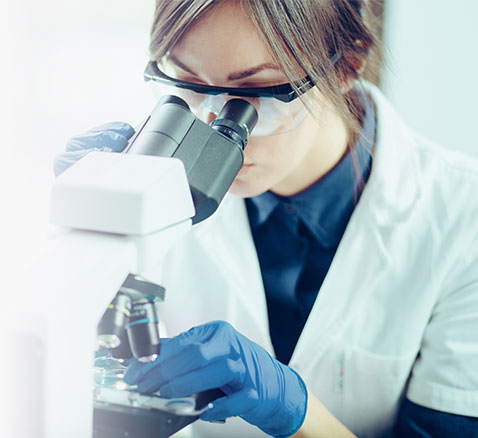What If The Antigen Test Is Negative?
Publications suggest the sensitivity for Histoplasma or Blastomyces antigen in urine approaches 100% but the results of clinical testing indicate negative results occur perhaps in 5-10% of cases. The causes for false negative results include limited fungal burden which occurs in cases with focal lung lesions, skin lesions, ocular lesions, etc. Negative results may also occur in the first few weeks following onset of symptoms.
ANSWER: I recommend sending urine and serum with instructions to test the urine for either Histoplasma or Blastomyces antigen (Primary tests). There is no need to test for both Histoplasma and Blastomyces antigen since they are cross-reactive. If the primary tests are negative, perform the secondary tests, which may help with diagnosis. If the illness has been present for a month or less submit a convalescent specimen, which may have become positive with progressive infection. If the antigen and antibody tests are negative diagnosis may be established by cytopathology or histopathology of lesions or body fluids.
Recommendations Based on Suspected Diagnosis
Sensitivity and Specificity MiraVista Tests
REFERENCES:
- Mourning AC, Patterson EE, Kirsch EJ, et al. Evaluation of an enzyme immunoassay for antibodies to a recombinant Blastomyces adhesin-1 repeat antigen as an aid in the diagnosis of blastomycosis in dogs. J Am Vet Med Assoc 2015 Nov 15; 247(10):1133-8.
- Foy DS, Trepanier LA, Kirsch EJ, Wheat LJ. Serum and urine blastomyces antigen concentrations as markers of clinical remission in dogs treated for systemic blastomycosis. J Vet Intern Med 2014 Mar; 28(2):305-10.
- Hanzlicek AS, Meinkoth JH, Renschler JS, Goad C, Wheat LJ. Antigen Concentrations as an Indicator of Clinical Remission and Disease Relapse in Cats with Histoplasmosis. J Vet Intern Med 2016 Jul; 30(4):1065-73.
- Cunningham L, Cook A, Hanzlicek A, et al. Sensitivity and Specificity of Histoplasma Antigen Detection by Enzyme Immunoassay. J Am Anim Hosp Assoc 2015 Sep; 51(5):306-10.
- Kirsch EJ, Greene RT, Prahl A, et al. Evaluation of coccidioides antigen detection in dogs with coccidioidomycosis. Clin Vaccine Immunol 2012 Mar; 19(3):343-5.
- Holbrook ED, Greene RT, Rubin SI, et al. Novel canine anti-Coccidioides immunoglobulin G enzyme immunoassay aids in diagnosis of coccidioidomycosis in dogs. Med Mycol 2019 Jan 12.
- Vorathavorn VI, Sykes JE, Feldman DG. Cryptococcosis as an emerging systemic mycosis in dogs. J Vet Emerg Crit Care (San Antonio ) 2013 Sep; 23(5):489-97.
- Billen F, Peeters D, Peters IR, et al. Comparison of the value of measurement of serum galactomannan and Aspergillus-specific antibodies in the diagnosis of canine sino-nasal aspergillosis. Vet Microbiol 2009 Feb 2; 133(4):358-65.
- Barrs VR, Ujvari B, Dhand NK, et al. Detection of Aspergillus-specific antibodies by agar gel double immunodiffusion and IgG ELISA in feline upper respiratory tract aspergillosis. Vet J 2015 Mar; 203(3):285-9.
- Garcia RS, Wheat LJ, Cook AK, Kirsch EJ, Sykes JE. Sensitivity and specificity of a blood and urine galactomannan antigen assay for diagnosis of systemic aspergillosis in dogs. J Vet Intern Med 2012 Jul; 26(4):911-9.
- Spector D, Legendre AM, Wheat J, et al. Antigen and antibody testing for the diagnosis of blastomycosis in dogs. J Vet Intern Med 2008 Jul; 22(4):839-43.
- Cook AK, Cunningham LY, Cowell AK, Wheat LJ. Clinical evaluation of urine Histoplasma capsulatum antigen measurement in cats with suspected disseminated histoplasmosis. J Feline Med Surg 2012 Aug; 14(8):512-5.
- Wheat J, French ML, Kohler RB, et al. The diagnostic laboratory tests for histoplasmosis: analysis of experience in a large urban outbreak. Ann Intern Med 1982 Nov; 97(5):680-5.
- Sykes JE. Canine and Feline Infectious Diseases, St. Louis, MO, Elsevier Saunders. 2019.
- Trivedi SR, Sykes JE, Cannon MS, et al. Clinical features and epidemiology of cryptococcosis in cats and dogs in California: 93 cases (1988-2010). J Am Vet Med Assoc 2011 Aug 1; 239(3):357-69.
- Trivedi SR, Malik R, Meyer W, Sykes JE. Feline cryptococcosis: impact of current research on clinical management. J Feline Med Surg 2011 Mar; 13(3):163-72.

